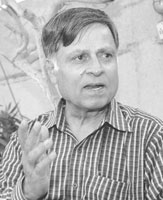Ahfaz-ur-Rahman
| Ahfaz-ur-Rahman احفاظ الرحمٰن | |
|---|---|
 | |
| Born | Ahfaz-ur-Rahman 4 April 1942 Jabalpur, India |
| Nationality | Pakistani |
| Occupation | Journalist |
Ahfaz-ur-Rahman (Urdu: احفاظ الرحمٰن ) (born 4 April 1942), is a Pakistani journalist, writer and poet. He has struggled for thefreedom of the press and for the rights of working journalists and other media workers, and raised his voice both against the numerous dictatorial Pakistani regimes and the corporate media houses who refuse to give the journalists and other workers of the press industry their due.
Rahman has written many books and translations[1] and which equally inspire for his efforts for press freedom and implementation of Wage Board Award. He has been tributed as "a rare breed"[1] in the Pakistani media circles.
Personal life[edit]
Background[edit]
Rahman was born in Jabalpur, India and migrated with his family to Pakistan in 1947.[1] During his secondary education he won the first prize[1] He was inspired by Sahir Ludhyanvi, Krishan Chander and other stalwarts of the Progressive Writers' Movement since his school days, it was not surprising that he came up as a student leader of the left-wing student organisation, National Students Federation (NSF) and took part in 1962 and 1964 student upsurges against General Ayub Khan's regime with zeal.[1]
Activism[edit]
Rahman began his activism a new upon returning to Pakistan from China at the end of 1972. During the historic journalist movement against Zia-ul-Haq's regime in 1977–78, Rahman went underground and organised that movement and had to escape arrest during that period. The movement had started in 1977, when the Daily Musawaat, Karachi, a newspaper with Pakistan Peoples Party (PPP) leanings, was banned by General Zia's government.[1]
During the Zia ul Haq regime, from December 1977 to July 1978, Rahman organised the movement for the freedom of the press.
On December 1977, journalists form all over the country came to Karachi to offer court arrest in batches. Rahman was the first journalist to be arrested in the first batch. And from 30 April 1978 to 30 May 1978 More than 120 journalists who came from various cities to court arrest in Lahore were arrested and sent to different jails of the Punjab province. Rahman was again among the first to be arrested and sent to Camp Jail. Later he was taken out of the jail and debarred from the Punjab province for six months. In July 1978 journalists form all corners came to Karachi for court arrest and were sent to different jails of the Sindh province. In the meantime, Rahman went underground to organise batches consisting of journalists, workers, peasants and student volunteers for court arrest.[1] After the movement ended, Rahman was blacklisted by all major newspapers and magazines, as a result he faced economic difficulties due to a long period of unemployment.
Journalistic career[edit]
After coming back to Pakistan in 1993, with the Zia era over, Rahman joined Daily Jang, the largest selling Urdu newspaper in Pakistan, as the Magazine Editor. In 2002, he was elected unopposed President of the Pakistan Federal Union of Journalists (PFUJ), which is the sole representative body of Pakistani journalists and is affiliated with the International Federation Of Journalists (IFJ), the largest federation of journalists in the world.[2] As the president of the PFUJ when he constantly protested against the greed of the newspaper and media house owners of the country for not giving the workers their due rights and for not implementing the wage board award[3] as had been directed by the Government for long. He was terminated from services for his outspoken activism.[3] After yet another period of unemployment, Rahman finally found a job in the Urdu newspaper Daily Express as the Magazine Editor. He also writes a weekly column that appears on Sundays in Daily Express, titled "Black and White" (Syaah o Safaid) In November 2007, Rahman was among the first journalists to be arrested[4] during the protests[5] against the Musharraf government's decision to ban several media channels. Rahman has worked to "revitalize" the Karachi Press Club and has "condemned the opportunist elements that were bent upon de-politicising the vibrant club".[6]
In February 2008, in what was a first in the history of Pakistani literature, four of his newly published books were launched at Arts Council Karachi[7] on the same day in a well-attended ceremony that attracted people, including poets, writers, journalists, trade unionists and activists.
At the sixth International Urdu Conference that took place at the Karachi Arts Council in November, 2013, a new collection of Rahman's poetry, titled 'Zinda Hai Zindagi' (Life, it is alive!) was launched. Leading poet and feminist Fehmida Riaz spoke on the occasion and said, “His poetry is an engaging account of our collective yearnings for what this nation has yet to achieve.” Zahida Hina and Shamim Hanfi also spoke on the occasion, about Rahman's literary works.[8][9] Senior writer and Man Booker International Prize nominee for 2013, Intizar Hussain in his review of the collection, opined that through his poetry Rahman is "searching for hope amid despair".[10]
In newspapers as[edit]
- Executive Editor Daily Amn, 2004–2005 [11]
Professional trade unionism[edit]
Bibliography[edit]
Poetry
- Zinda Hai Zindagi, a collection of poems [10]
Original Urdu Work
- 30 short stories in literary magazines[1]



No comments:
Post a Comment